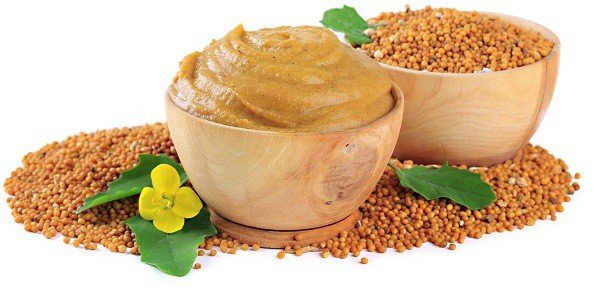Mustard

Mustard is a hot, aromatic annual plant, reaching 40-50 cm, with relatively complex roots. Its stem is erect, branched and hairless.
Its leaves are simple, becoming smaller towards the top of the stem. Mustard flowers are yellow. The seeds, from which the popular mustard in our country is also prepared, are small black-gray, brown or pale yellow. Mustard flowers in May and the fruits ripen in June.
There are many varieties, but the most famous are the white, brown and black mustard.
The white comes from the Mediterranean region, the brown from the Himalayas, and the black from the Middle East.
An interesting fact is that mustard seeds are mentioned in ancient Sanskrit manuscripts dating back 5000 years. Even the ancient Greeks used the seeds of this plant to prepare food, and the mustard paste, known in our country as mustard, was invented by the Romans.
Nutritional value
The caloric content of fresh mustard is 162 kilocalories, and of prepared mustard is 67 kilocalories /both values are for 100 grams/.
Beneficial properties
Mustard seeds contain 25-35% oil, which is obtained as a result of pressing, and also essential oil, which consists of allyl mustard oil /40%/, crotonyl mustard oil and traces of carbon disulfide.
After extracting the oil from the mustard seeds, a powder remains from them, which is a raw material for the production of antirheumatic ointments.
Mustard seeds not only stimulate the appetite, increasing the secretion of saliva 8 times, but also aid digestion. They are also an excellent anti-inflammatory, antioxidant and mild laxative.
In small quantities, this spice neutralizes toxins and helps with stomach upset, but in larger doses it can cause irritation of the lining of the esophagus.
Scientists have already proven that mustard belongs to the spices with the strongest healing effect. Mustard seeds support the absorption of fatty foods, which are difficult to process by gastric juices and stay too long in the digestive system.
In elderly people, this spice favors faster metabolism. Mustard seeds are used for various cardiovascular diseases /atherosclerosis, hypertension/, for diseases of the liver and bile ducts, for digestive disorders, flatulence and rheumatism.
When small children have no appetite, they often instinctively prefer mustard, assuming it will help them. Preparations based on this spice have a local irritating effect.
The volatile vapors of mustard have antibacterial and phytoncide properties. Therefore, this spice is used in the food industry to store perishable food products.
Some scientists believe that drinking ground mustard seeds on an empty stomach helps to sharpen the mind, is also useful for poisoning with any toxic substances and clears vision.
Mustard oil contains beta sitosterol /shows estrogen-like, antiatherosclerotic, antifungal and bacteriostatic activity/, choline, chlorophyll /improves blood composition by increasing the amount of leukocytes, erythrocytes and hemoglobin levels/, nicotinic acid, vitamin A, E, D, B6, K and P, and is also a natural antibiotic.
It has an original and pleasant taste and is rich in isothiocyanates, synergin, essential mustard oil, and this is why its bactericidal and anthelmintic activity.
In mustard oil, vitamin A is stored for a long time /up to 8 months/, and retinol supports the growth and development of the body, ensures the normal function of the epithelium of the skin and mucous membranes.



